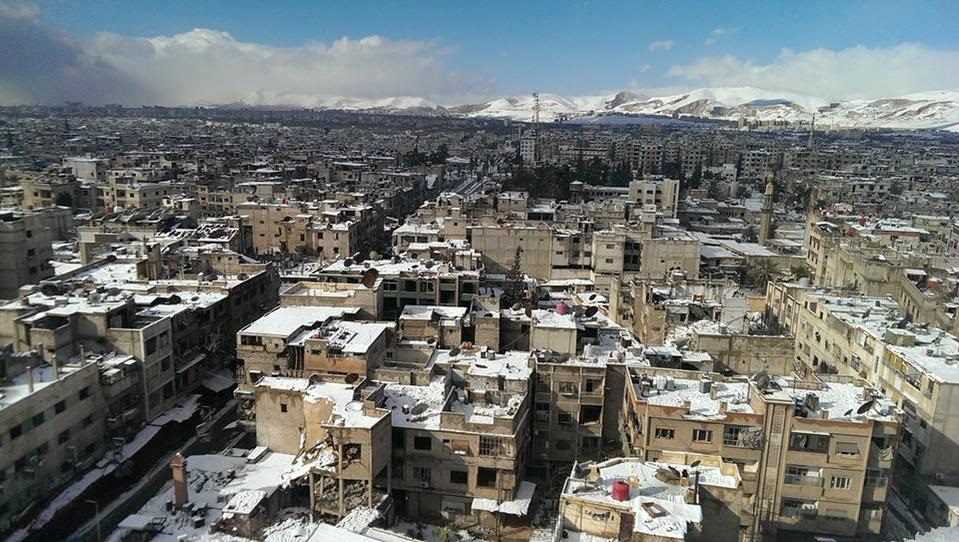Questions of ‘overstepping’ judiciary as Jaish al-Islam claims Douma victory
January 9, 2015 AMMAN: Although the result appears to have […]
9 January 2015
January 9, 2015
AMMAN: Although the result appears to have met with public approval, Jaish al-Islam’s defeat this week of a rival faction in Douma accused of mafia-style behavior is raising questions about the rebel group’s increasingly unilateral tactics in East Ghouta.
On Sunday, Jaish al-Islam (JAI) leader Zahran Aloush announced the launch of the “Cleansing the Country of the Filth of Corruption” campaign, one specifically targeted against Jaish al-Umma (JAU) in East Ghouta’s Douma city after months of complaints from residents surrounding JAU abuses of power and criminality—including stories of beatings, drug trading and war profiteering.

“Eliminating Jaish al-Umma is a very important step in correcting the path of the revolution in East Ghouta,” JAI spokesman Ghazwan al-Hakeem told Syria Direct.
“It was necessary to take out the corrupt, the drug dealers and the bandits.”
Meanwhile, a spokesman for Jaish al-Umma said that Jaish al-Islam’s offensive was about “personal and power disputes.”
JAI’s campaign reportedly involved attacks Sunday on major JAU headquarters and raids on the houses of JAU commanders in Douma. Within hours, JAI had taken Umma’s bases in the city and captured at least five top leadership figures, including JAU leader Ahmed Taha (Abu Subhi), reported local pro-opposition newspaper al-Khabar.
JAI spokesman al-Hakeem confirmed to Syria Direct that Ahmed Taha “was injured, and then arrested,” but declined to elaborate further.
As for JAU’s rank and file, Umma’s General Command posted on its Facebook page that up to 300 members had surrendered themselves to Jaish al-Islam.
But an Umma spokesman contradicted the group’s own statement: “Our members did not turn themselves in, rather they were captured,” JAU spokesman Mohammed Abu Udai told Syria Direct, but did not explain the disparity.
Jaish al-Islam (JAI) concluded its campaign Wednesday by taking rival Jaish al-Umma (JAU) military commander Abu Umar a-Dibs into custody.
An uncle of a-Dibs confirmed his arrest to Syria Direct, saying that a-Dibs “voluntarily turned himself in to prevent discord (fitna)” following the capture of the rest of JAU’s leadership.
JAI is the most powerful of the ruling rebel factions in the city of Douma, now home to an estimated 90,000 people. It is considered strategic because of its location 14 kilometers east of Damascus in East Ghouta, and like other towns and cities in that rebel-held region has been afflicted for more than two years by both regime encirclement and bombardment inside and out.
In Douma, JAI has been involved in a turf war with Umma since the latter announced its creation in September, turning Douma into a “realm of explosions and IED’s and direct clashes,” residents who had fled the city told Al-Monitor in late November.
In a dozen interviews conducted with residents and activists still in Douma, a complicated picture of Jaish al-Umma emerges as a group characterized by moral bankruptcy even as it was populated by some of the most famous revolutionaries around Damascus, such as Abu Ali Khabiya, known as the first to enter the capital’s Maydan neighborhood under the FSA’s banner in July 2012 before rebels were driven out.
On Monday, minarets across Douma announced Jaish al-Islam’s arrest of the same Abu Ali Khabiya, calling him the “biggest criminal in East Ghouta,” according to a voice recording obtained by Syria Direct.
By imposing payments on food caravans entering Douma through the only open crossing into the city, Abu Ali Khabiya had come to be associated with thuggery and profiteering, characteristics Douma residents used to describe Jaish al-Umma in general.
Lawrence al-Ghouta, the alias of a doctor with Douma’s Medical Bureau who says he has no connection to armed activity or local politics, told Syria Direct that JAU had arrested him last year “without any proof…the charge directed against me was an attempt to kill JAU leader Ahmed Taha.” JAU soldiers broke his leg.
Another Douma resident who requested anonymity described JAU’s downfall as a type of purification.
“I won’t hide my joy [at JAU’s demise]; the country relaxed and people felt that the area was cleansed,” the activist told Syria Direct.
A second activist wrote on a closed Facebook page for local citizen journalists that “the campaign met with a popular response in general, and was quick and successful.”
Power grab?
But although the Douma street and other local rebels appear to support the demise of JAU, others take issue with JAI’s decision to unilaterally launch its campaign against Umma, fearing that the group is becoming increasingly autocratic and taking over the role of the Judiciary Council of East Ghouta.
The Judiciary Council is ostensibly independent and responsible for issuing summonses, trying criminals and combating corruption, as well as maintaining prisons and carrying out sentences in the rebel-controlled region.
In response to criticism on social media and Syria’s pro-opposition news sites, Jaish al-Islam leader Zahran Aloush denied his group acted unilaterally in a campaign “to eliminate every last corrupt individual in East Ghouta.” Aloush said in a video statement Thursday that JAI “asked permission” of the judicial council and received verbal approval to carry out the campaign “because the judiciary does not have enough power to protect itself [from Jaish al-Umma.]”
Feilaq a-Rahman, Ajnad a-Sham and Ahrar a-Sham in East Ghouta released a joint statement earlier this week denying participation in JAI’s campaign but affirming their “support for the Judiciary Council of East Ghouta to combat corruption and the corrupt.”
Similarly, an employee with the council who asked to remain anonymous said that “what happened needed to happen…but Jaish al-Islam overstepped the judiciary and that’s a problem.”
“I’m afraid JAI’s goal by doing that is to bring about the judiciary’s fall.”
For more from Syria Direct, like us on Facebook or follow us on Twitter.







